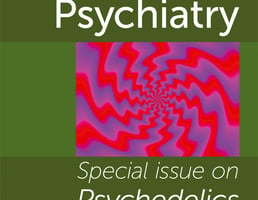Treating patients who have depression following a recent heart attack or unstable angina with...
Brain Scans Yield Clues on How Psylocibin Works to Alleviate Depression

A study involving brain scans of depressed patients treated with the selective serotonin reuptake inhibitor (SSRI) escitalopram or the psychedelic substance psilocybin is shedding light on how these compounds work differently to alleviate depression. The findings were published today in the American Journal of Psychiatry.
Previous research has shown that soon after beginning a course of SSRIs, patients with depression as well as healthy subjects experience a decreased amygdala responsiveness to emotional stimuli, noted Matthew B. Wall, Ph.D., of Perceptive Inc. and Imperial College London, and colleagues. “Researchers hypothesize that this emotional (amygdala) blunting is the key to SSRI’s therapeutic effect.”
Wall and colleagues conducted functional magnetic resonance imaging (fMRI) on 46 adults with moderate to severe depression who were participating in a randomized clinical trial. Of these, 25 received two dosing sessions with 25 mg psilocybin each—a dose expected to trigger profound acute effects—three weeks apart, plus six weeks of daily placebo. The remaining 21 participants received 1 mg psilocybin—a “placebo dose” with no psychedelic effects—plus six weeks of escitalopram (10 mg a day for three weeks, then 20 mg a day for three weeks).
At baseline and six weeks later, researchers used fMRI to assess participants’ brain activity when viewing three types of facial expressions (fearful, happy, and neutral); they also assessed participants’ depressive symptoms, anhedonia, and emotional intensity.
Both groups experienced significant reductions in depressive symptoms and anhedonia at the end of treatment. Participants who received escitalopram showed a significant reduction in emotional responses to all three types of facial expressions, while participants who received psilocybin showed no change in response to happy or fearful faces, and a slight increase in response to neutral faces. An exploratory analysis looking for connections between imaging and clinical outcomes suggested that symptom improvement in the escitalopram group was correlated with decreases in emotional intensity. However, in the psilocybin group, symptom improvement correlated with increases in emotional intensity.
“I think the key takeaway is that the two therapies we studied, escitalopram and psilocybin, work in very different ways,” Wall told Psychiatric News Alert via email. “Both have antidepressant effects, but escitalopram has an overall blunting effect on emotions in at least some patients, whereas psilocybin seems not to. Psilocybin therapy might therefore be a good option in the future for those patients who may be struggling with the emotional blunting effects of SSRIs.”
For related information, see the Psychiatric News articles “Depression Improves Following Single Dose of Psilocybin” and “Psychedelic Use in Psychiatry Demands New Informed Consent Process, Bioethicists Say.”
(Image: Getty Images/iStock/microgen)
Don't miss out! To learn about newly posted articles in Psychiatric News, please sign up here.





